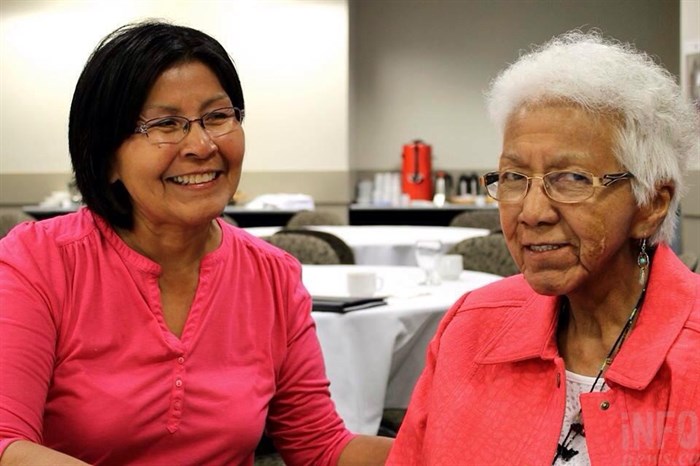
Program coordinator June Kelly with elder and program instructor Mona Jules
(GLYNN BROTHEN / iNFOnews.ca)
April 28, 2015 - 10:30 AM
KAMLOOPS - Learning to speak our first language is a process we likely take for granted. Our families spoke it from the day we were born, we absorbed what they said and learned to speak, read and write it, and then our schools expanded on that knowledge as we got older.
For Mona Jules learning Secwepemctsin — her first language and the language of the Secwepemc First Nations — took more than just the first few years of her life. She studied how to read and write it but her knowledge was stunted when her school teachers told her not to speak it any further.
Now 74, Jules is the Secwepemctsin language instructor at Thompson Rivers University. Last week she watched her 17 students celebrate their first year in the program as they work to grow the group of just 200 or so fluent Secwepemctsin speakers in the Kamloops area and become language teachers themselves.
For Jules, the relationship with her language was not always positive. Her treatment in a residential school made her struggle to appreciate it and not speak.
"Leaving the school, I felt ashamed, I felt inferior. I felt the language wasn’t valuable. The words of my grandmother (were) always in the back of my mind. She would always tell me ‘be proud of your language. You speak it no matter where you are. Never ever be ashamed of your language.’ So now I pass that information on to my grandchildren and speak to them as much as I can,” she says.
To honour her family and culture she continued studying. She became a researcher, a language assistant and carried out a lengthy career fostering Secwepemctsin. She recalls her own teacher, a 78-year-old who encouraged activities to learn words and phrasing. Jules says the woman would jump up on her chair or crawl around on the floor encouraging students to participate.
“She was very dynamic. She didn’t look at all over 50. She was very good. She would get on the floor and crawl around — do whatever. She’d have about 40 or 50 of us doing the same. You feel shy and unnatural at first in doing that. She would stand on her chair. She would say ‘okay you shouldn’t be doing this but there’s words for it,’” she says.
Jules retired from her career, but says it was only a few months until she 'got bored.'
"I saw the position offered here for over a year with nobody stepping up to teach so I decided to come back,” she says.
In teaching the language to both First Nations students and non-First Nation students, she uses a lot of repetition and routine. Jules teaches them show and tell through items such as plants and puppets.
First Nations Language Coordinator June Kelly says it doesn’t matter if students enter the program with a basic or advanced knowledge of the language; at the end of the day 'they’ll teach it to you' in the most immersive way possible. Repetitive speaking, writing and reading is coupled with traditional activities such as basket weaving and story-telling. The first words taught are the same as in other languages, how to introduce themselves with words and phrases such as hello (Weyt-k) and how are you? (Lé7-en-k tuc?).
It’s easy to see the students appreciate Jules’ knowledge of the topic. Each greet her or say goodbye to her with the newly-taught words. Yet despite keeping Secwepemctsin alive, Jules remains humble.
“It’s the students themselves. They have to put the hours in to study. They have to put the effort in. They have to have respect for the language and the people. It’s through their own efforts that they’re gaining the language,” she says. "I just present it because I was born with the language. I present it in honour of my grandparents and the other elders that I’ve worked with over the years. I have to thank them for prodding me on when I didn’t really want to speak the language."
To try and learn a few phrases yourself, go to FirstVoices.com to listen to Jules speak Secwepemctsin. Jules was one of nearly a dozen elders who worked with the Secwepemc Cultural Education Society and First Voices to create the database of the Secwepemctsin language that could be shared online and in a phone app.
To contact a reporter for this story, email Glynn Brothen at gbrothen@infonews.ca, or call 250-319-7494. To contact the editor, email mjones@infonews.ca or call 250-718-2724.
— EDITOR'S NOTE: 'lleqméltn' translates to teacher
News from © iNFOnews, 2015